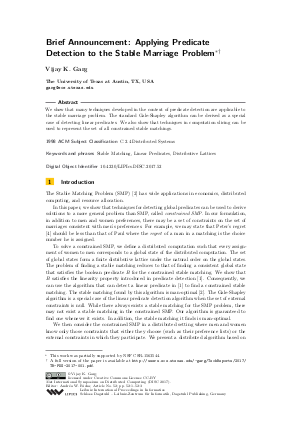Brief Announcement: Applying Predicate Detection to the Stable Marriage Problem
Author Vijay K. Garg
-
Part of:
Volume:
31st International Symposium on Distributed Computing (DISC 2017)
Part of: Series: Leibniz International Proceedings in Informatics (LIPIcs)
Part of: Conference: International Symposium on Distributed Computing (DISC) - License:
 Creative Commons Attribution 3.0 Unported license
Creative Commons Attribution 3.0 Unported license
- Publication Date: 2017-10-12
File

PDF
LIPIcs.DISC.2017.52.pdf
- Filesize: 390 kB
- 3 pages
Document Identifiers
Subject Classification
Keywords
- Stable Matching
- Linear Predicates
- Distributive Lattices
Metrics
- Access Statistics
-
Total Accesses (updated on a weekly basis)
0Document
0Metadata
Abstract
We show that many techniques developed in the context of predicate detection are applicable to the stable marriage problem. The standard Gale-Shapley algorithm can be derived as a special case of detecting linear predicates. We also show that techniques in computation slicing can be used to represent the set of all constrained stable matchings.
Cite As Get BibTex
Vijay K. Garg. Brief Announcement: Applying Predicate Detection to the Stable Marriage Problem. In 31st International Symposium on Distributed Computing (DISC 2017). Leibniz International Proceedings in Informatics (LIPIcs), Volume 91, pp. 52:1-52:3, Schloss Dagstuhl – Leibniz-Zentrum für Informatik (2017)
https://doi.org/10.4230/LIPIcs.DISC.2017.52
BibTex
@InProceedings{garg:LIPIcs.DISC.2017.52,
author = {Garg, Vijay K.},
title = {{Brief Announcement: Applying Predicate Detection to the Stable Marriage Problem}},
booktitle = {31st International Symposium on Distributed Computing (DISC 2017)},
pages = {52:1--52:3},
series = {Leibniz International Proceedings in Informatics (LIPIcs)},
ISBN = {978-3-95977-053-8},
ISSN = {1868-8969},
year = {2017},
volume = {91},
editor = {Richa, Andr\'{e}a},
publisher = {Schloss Dagstuhl -- Leibniz-Zentrum f{\"u}r Informatik},
address = {Dagstuhl, Germany},
URL = {https://drops.dagstuhl.de/entities/document/10.4230/LIPIcs.DISC.2017.52},
URN = {urn:nbn:de:0030-drops-79719},
doi = {10.4230/LIPIcs.DISC.2017.52},
annote = {Keywords: Stable Matching, Linear Predicates, Distributive Lattices}
}
Author Details
References
-
Craig M Chase and Vijay K Garg. Detection of global predicates: Techniques and their limitations. Distributed Computing, 11(4):191-201, 1998.

-
David Gale and Lloyd S Shapley. College admissions and the stability of marriage. The American Mathematical Monthly, 69(1):9-15, 1962.

- Vijay K. Garg. Applying predicate detection to the stable marriage problem. Technical Report TR-PDS-2017-001, The University of Texas at Austin, May 2017. URL: http://users.ece.utexas.edu/~garg/TechReports/2017/TR-PDS-2017-001.pdf.
-
Dan Gusfield and Robert W Irving. The stable marriage problem: structure and algorithms. MIT press, 1989.

-
Neeraj Mittal and Vijay K Garg. Computation slicing: Techniques and theory. In International Symposium on Distributed Computing, pages 78-92. Springer, 2001.

